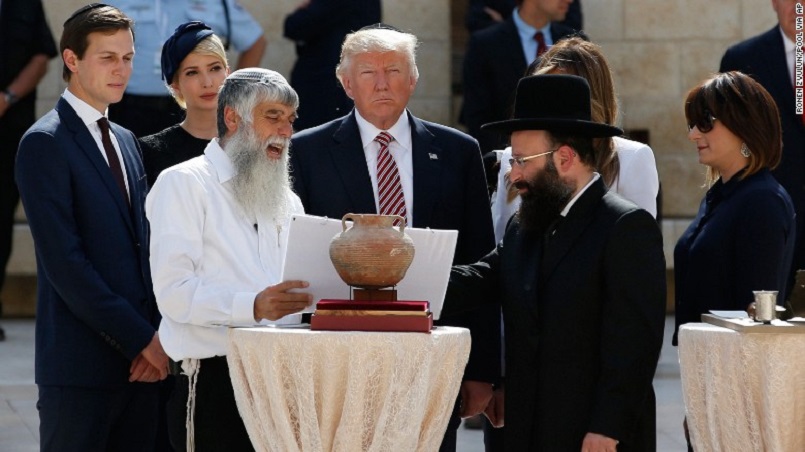
If the Israelis or Palestinians were looking for a political victory from President Donald Trump's first visit to the region, both were left wanting.
In public statements made with Israeli Prime Minister Benjamin Netanyahu and Palestinian President Mahmoud Abbas, Trump didn't explicitly mention a two-state solution, the accepted framework for a peace deal between the two sides -- an omission which Israeli hardliners, opposed to the establishment of a Palestinian state, celebrated.
But neither did Trump mention moving the US embassy from Tel Aviv to Jerusalem or accepting a united Jerusalem as the capital of Israel. Trump, wading into the sensitive waters of the Israeli-Palestinian conflict, stepped lightly, careful not to offend or endorse either side.
In becoming the first sitting President to visit the Western Wall -- Judaism's holiest site for prayer -- Trump could have implicitly endorsed Israeli sovereignty over the Old City of Jerusalem. But Trump visited alone -- without Netanyahu -- careful not to prejudge one of the most sensitive issues in the conflict.
Israeli and Palestinian leaders each highlighted their own main issues -- for Palestinians, ending the Israeli occupation of East Jerusalem and the West Bank; for Israelis, ending Palestinian payments to prisoners and those killed attacking Israelis. Trump didn't take the bait either time, sticking to his scripted remarks and walking a fine line on the issues. Instead of pinning blame, he spoke optimistically, if generically, of making compromises and reaching agreements.
"They say that we must choose between supporting Israel and supporting Arab and Muslim nations in the region. That is completely wrong. All decent people want to live in peace, and all humanity is threatened by the evils of terrorism," said Trump.
Even so, Trump veered toward symbolism instead of substance. He offered little in the way of concrete steps to reconcile the different positions between Israelis and Palestinians, instead promising a renewed effort to bring the sides together.
Trump acknowledged the difficulty in sealing what he has called "the ultimate deal," but said in his keynote speech at the Israel Museum on Tuesday morning, "The Palestinians are ready for peace ... I can tell you that [Netanyahu] is also reaching for peace."
Still, when Air Force One departed the Holy Land for Rome, Trump left Israelis and Palestinians with the impression that his visit leaned slightly to the Israeli camp. His tweets -- and his time -- tended to highlight the Israeli leaders he met, not the Palestinian.
And in contrast to former President Barack Obama, Trump never mentioned Israel's occupation of East Jerusalem and the West Bank, and he never condemned settlements, despite saying settlement expansion is unhelpful to peace in earlier statements.
The issue that Trump kept bringing up in his speeches was his meetings in Saudi Arabia with King Salman and with other Arab leaders. "That historic summit," said Trump, referring to Riyadh, "represents a new opportunity for people throughout the Middle East to overcome sectarian and religious divisions to extinguish the fires of extremism, and find common ground and shared responsibility in making the future of this region. Change must come from within."
It is his time in Saudi Arabia, it seems, that has left Trump convinced that an historic peace deal between Israelis and Palestinians is possible.
Both sides stressed the cooperation with the United States, either during or after the visit.
Speaking next to Trump at the Israel Museum, Netanyahu said, "Israel has never had and will never have a better friend than the United States of America," before going on to thank Trump personally. Trump reaffirmed the alliance, saying, "My administration will always stand with Israel."
In a similar statement, Husam Zomlot, chief Palestinian representative to the United States, said, "There is a very solid bilateral relationship between the US and Palestine based on many years of working together." Again, Trump backed the partnership, addressing the "very positive counterterrorism efforts" between the Americans and Palestinians.
Though the visit to Israel and the West Bank was supposed to restart the peace process for the first time since negotiations broke down in April 2014, the Trump administration left without declaring what the definitive next step would be. Although initial expectations were of a trilateral meeting between Trump, Netanyahu and Abbas, those expectations were dramatically scaled back, replaced with confidence-building measures between the two sides.
And instead of declaring confidently that he'd get the deal done, Trump expressed hope that he could, saying, "With determination, compromise and the belief that peace is possible, Israelis and Palestinians can make a deal."
